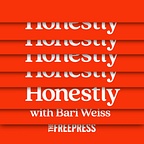It’s that time of year again–reliably bumming out students and parents alike… it ’s back to school! But back to school is also a time to reflect on the state of education in this country… and it’s not all that great.
America is one of the richest countries in the world. But you wouldn’t know it if you looked at our education statistics. We’re 16th in sc…
Continue Reading The Free Press
To support our journalism, and unlock all of our investigative stories and provocative commentary about the world as it actually is, subscribe below.
$8.33/month
Billed as $100 yearly
$10/month
Billed as $10 monthly
Already have an account?
Sign In
Make a comment
Share article



